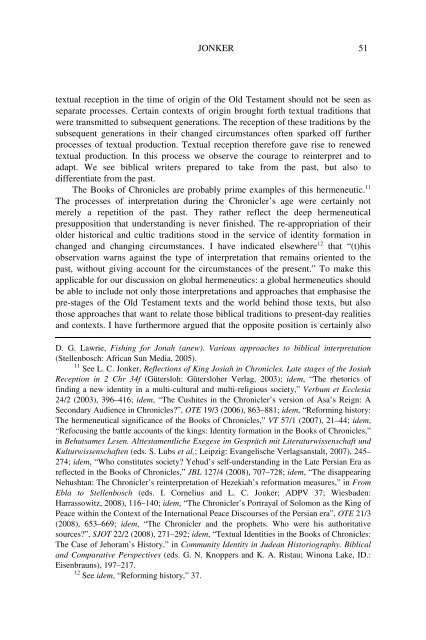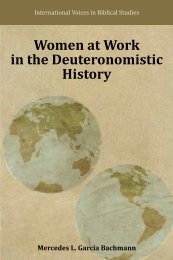Global Hermeneutics? - International Voices in Biblical Studies ...
Global Hermeneutics? - International Voices in Biblical Studies ...
Global Hermeneutics? - International Voices in Biblical Studies ...
Create successful ePaper yourself
Turn your PDF publications into a flip-book with our unique Google optimized e-Paper software.
JONKER 51<br />
textual reception <strong>in</strong> the time of orig<strong>in</strong> of the Old Testament should not be seen as<br />
separate processes. Certa<strong>in</strong> contexts of orig<strong>in</strong> brought forth textual traditions that<br />
were transmitted to subsequent generations. The reception of these traditions by the<br />
subsequent generations <strong>in</strong> their changed circumstances often sparked off further<br />
processes of textual production. Textual reception therefore gave rise to renewed<br />
textual production. In this process we observe the courage to re<strong>in</strong>terpret and to<br />
adapt. We see biblical writers prepared to take from the past, but also to<br />
differentiate from the past.<br />
The Books of Chronicles are probably prime examples of this hermeneutic. 11<br />
The processes of <strong>in</strong>terpretation dur<strong>in</strong>g the Chronicler’s age were certa<strong>in</strong>ly not<br />
merely a repetition of the past. They rather reflect the deep hermeneutical<br />
presupposition that understand<strong>in</strong>g is never f<strong>in</strong>ished. The re-appropriation of their<br />
older historical and cultic traditions stood <strong>in</strong> the service of identity formation <strong>in</strong><br />
changed and chang<strong>in</strong>g circumstances. I have <strong>in</strong>dicated elsewhere 12 that “(t)his<br />
observation warns aga<strong>in</strong>st the type of <strong>in</strong>terpretation that rema<strong>in</strong>s oriented to the<br />
past, without giv<strong>in</strong>g account for the circumstances of the present.” To make this<br />
applicable for our discussion on global hermeneutics: a global hermeneutics should<br />
be able to <strong>in</strong>clude not only those <strong>in</strong>terpretations and approaches that emphasise the<br />
pre-stages of the Old Testament texts and the world beh<strong>in</strong>d those texts, but also<br />
those approaches that want to relate those biblical traditions to present-day realities<br />
and contexts. I have furthermore argued that the opposite position is certa<strong>in</strong>ly also<br />
D. G. Lawrie, Fish<strong>in</strong>g for Jonah (anew). Various approaches to biblical <strong>in</strong>terpretation<br />
(Stellenbosch: African Sun Media, 2005).<br />
11 See L. C. Jonker, Reflections of K<strong>in</strong>g Josiah <strong>in</strong> Chronicles. Late stages of the Josiah<br />
Reception <strong>in</strong> 2 Chr 34f (Gütersloh: Gütersloher Verlag, 2003); idem, “The rhetorics of<br />
f<strong>in</strong>d<strong>in</strong>g a new identity <strong>in</strong> a multi-cultural and multi-religious society,” Verbum et Ecclesia<br />
24/2 (2003), 396–416; idem, “The Cushites <strong>in</strong> the Chronicler’s version of Asa’s Reign: A<br />
Secondary Audience <strong>in</strong> Chronicles?”, OTE 19/3 (2006), 863–881; idem, “Reform<strong>in</strong>g history:<br />
The hermeneutical significance of the Books of Chronicles,” VT 57/1 (2007), 21–44; idem,<br />
“Refocus<strong>in</strong>g the battle accounts of the k<strong>in</strong>gs: Identity formation <strong>in</strong> the Books of Chronicles,”<br />
<strong>in</strong> Behutsames Lesen. Alttestamentliche Exegese im Gespräch mit Literaturwissenschaft und<br />
Kulturwissenschaften (eds. S. Lubs et al.; Leipzig: Evangelische Verlagsanstalt, 2007), 245–<br />
274; idem, “Who constitutes society? Yehud’s self-understand<strong>in</strong>g <strong>in</strong> the Late Persian Era as<br />
reflected <strong>in</strong> the Books of Chronicles,” JBL 127/4 (2008), 707–728; idem, “The disappear<strong>in</strong>g<br />
Nehushtan: The Chronicler’s re<strong>in</strong>terpretation of Hezekiah’s reformation measures,” <strong>in</strong> From<br />
Ebla to Stellenbosch (eds. I. Cornelius and L. C. Jonker; ADPV 37; Wiesbaden:<br />
Harrassowitz, 2008), 116–140; idem, “The Chronicler’s Portrayal of Solomon as the K<strong>in</strong>g of<br />
Peace with<strong>in</strong> the Context of the <strong>International</strong> Peace Discourses of the Persian era”, OTE 21/3<br />
(2008), 653–669; idem, “The Chronicler and the prophets. Who were his authoritative<br />
sources?”, SJOT 22/2 (2008), 271–292; idem, “Textual Identities <strong>in</strong> the Books of Chronicles:<br />
The Case of Jehoram’s History,” <strong>in</strong> Community Identity <strong>in</strong> Judean Historiography. <strong>Biblical</strong><br />
and Comparative Perspectives (eds. G. N. Knoppers and K. A. Ristau; W<strong>in</strong>ona Lake, ID.:<br />
Eisenbrauns), 197–217.<br />
12 See idem, “Reform<strong>in</strong>g history,” 37.




